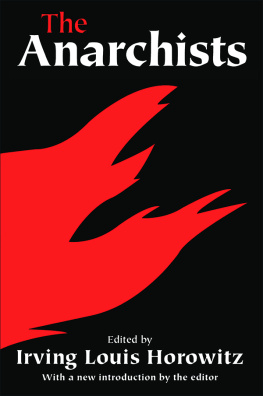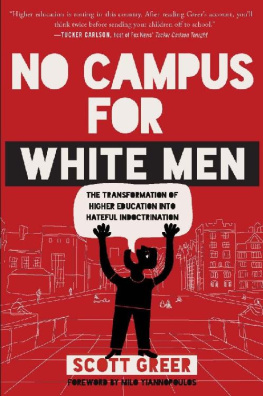Originally published in 1964 by Dell Publishing Co.
Published 2005 by Transaction Publishers
Published 2017 by Routledge
2 Park Square, Milton Park, Abingdon, Oxon, 0X14 4RN
711 Third Avenue, New York, NY 10017, USA
Routledge is an imprint of the Taylor & Francis Group, an informa business
New material this edition copyright 2005 by Taylor & Francis.
All rights reserved. No part of this book may be reprinted or reproduced or utilised in any form or by any electronic, mechanical, or other means, now known or hereafter invented, including photocopying and recording, or in any information storage or retrieval system, without permission in writing from the publishers.
Notice:
Product or corporate names may be trademarks or registered trademarks, and are used only for identification and explanation without intent to infringe.
Library of Congress Catalog Number: 200504982
Library of Congress Cataloging-in-Publication Data
The anarchists / Irving Loius [i. e. Louis] Horowitz, editor ; with a new introd.
by the editor.
p. cm.
Includes bibliographical references and index.
ISBN 0-202-30768-9 (alk. paper)
1. Anarchists. 2. Dissenters. I. Horowitz, Irving Louis.
HX826.A55 2005
335.80922dc22
2005040982
ISBN 13: 978-0-202-30768-8 (pbk)
The dedicated researcher will find more than one hundred thousand entries and just about one thousand definitions for the term anarchists in the search engines available in electronic format. At first blush, this in itself would serve to disqualify the republication of an older 1964 anthology on The Anarchists. But on deeper probing, the overlapping of such definitions does little to change matters in the course of time. One can take as an operational definition the idea put forth by many of these websites that anarchism is simply the doctrine of a free societywhere no force is necessary to establish or uphold freedom and liberty. Therefore, I should like to dedicate these new introductory pages to explain what has or rather has not happened in the past forty years to make this effort timely, rather than obsolete.
One critical element that makes the reproduction of such a volume more than anachronistic is that although the word anarchism ends, like so many other grandiose terms, with an ism the usual ploy for ideological labels it serves to highlight a set of powerfully held beliefs about human beings and social systems. Anarchism is less an ideology than a sentiment. It is indeed an ideal type a statement of a system rarely to be found in a universe of nation-states or even non-governmental agencies. Unless one prefers as a definition of anarchy its presumed equivalencies for sheer chaos, it is more customarily a statement of a system in which laws are few, rules of conduct expressed by individuals rather than imposed by collectivities, and a society guided by ethical conduct rather than power concentration.
This is perhaps best expressed by the need of almost all commentators to constantly think of anarchism in hyphenated terms or in regional geographic terms. As a result we find clusters of people in select nations identified with Christianity, community, gender, religion in short the full gamut of ascribed features of a human being that actually do exist. So at least one conception of anarchism is as a moral extension of being born into or acquiring a particular religion, nation, sex, race, and seeking to make a common ground with those who hold fast to the ethical tenets of political minimalism. This makes for a reasonable starting point. But such a definition also defines a variety of movements from humanism to libertarianism that also laid claim to a moral high ground for internalized personal behavior.
This volume is somewhat unique in that it owes its origins less to an interest in anarchism as such, so much as to a rounding out of a trilogy of works on revolutionary doctrines concocted by the late C. Wright Mills toward the close of his life. Initially, it was conceived as a trilogy with basic texts on Marxists, Trotskyites, and anarchists. The first volume, on The Marxists, Mills lived to complete, and curiously advance copies of the anthology shipped in March 1962, sadly the very month and week that he passed away at the age of forty-four-plus years.
The second volume, on the Trotskyites, Mills had barely sketched out in the rough. It fell to the late Isaac Deutscher, properly enough, to actually bring the volume to completion. As the outstanding biographer of Leon Trotsky, Deutscher was closer to the Trotskyites than Mills, who while earlier in his life had some modest flirtations with Trotsky, especially with Fourth International circles in the New York City area, clearly lost interest in the didacticism and dogmatism of the Trotskyites as a group. While retaining some association with Dwight Macdonald, who also drifted away from Fourth International standards of conduct, both he and Mills retained a life-long sense of opposition to Stalinist Russia and to Stalinism as such. This animus for the Stalinists, and preference for Marxists who retained a lively pragmatic sense of the West, were evident in The Marxists, nonetheless, such a vision had little impact on Deutschers fine volume. One suspects that it would nonetheless have retained Millss general approbation given his high respect for Deutscher personally, and for the combination of revolutionary fervor and intellectual skills Trotsky himself exhibited, which Mills certainly tried to simulate with respect to his writings on Cuba between 1959-1961.
The third and final volume, The Anarchists, was not even worked up as an outline by Mills. Its need came from his strong belief in the Franco-Italian mode of sociology, especially the study of mass movements, irrational leaders and interest driven organizational dynamics. Figures like Georges Sorel, Roberto Michels, and Gaetano Mosca, among others attracted Mills. His studies of actual anarchist movements had not yet begun. Having myself completed Radicalism and the Revolt Against Reason: The Political Sociology of Georges Sorel in 1961, Richard Huett, the lovely man who ran Dell-Delta at the time, suggested that I take on editing the third and final volume, and complete the task of the trilogy. I did so with pleasure. It was a final statement of support for Wright, fulfilling at least in part his intellectual legacy, and allowing for an appreciation of what his thinking meant in my own development.
While Wright Mills was too much of a curmudgeon to have a tight circle, his umbilical cord did have some carry. In relation to the trilogy of The Marxists, The Trotsky Reader, and The Anarchists this became apparent after his demise. Wright met Isaac Deutscher in England, when he was visiting professor at Sussex and living in London. They got on well, differing cultural styles notwithstanding. In turn, I met Deutscher during my own tour of duty as visiting lecturer at the London School in 1961. We met several times at his London flat, in the company of Isaacs wife. On one such occasion Ralph Miliband, who was another good friend to Mills in those final years, joined us. We were all readers and reviewers of the various drafts of













